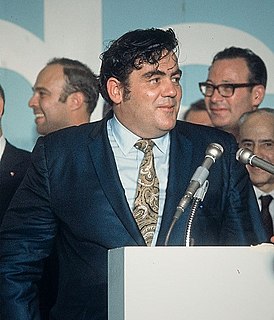A Quote by David Ebershoff
We are born, we live, we disappear. One of the chilling aspects of history is the swiftness with which it carries us into oblivion.
Related Quotes
Marriage is going to disappear, should disappear. And now the point is coming in the history of humanity where it becomes possible that marriage can disappear. It is already an outmoded phenomenon, it has lived too long and it has created nothing but misery. Marriage should disappear and love should flower again. One should live with insecurity and freedom. That I call intelligence.
Looked at sky through smoke heavy with human fat and God was not there. The cold, suffocating dark goes on forever and we are alone. Live our lives, lacking anything better to do. Devise reason later. Born from oblivion; bear children, hell-bound as ourselves, go into oblivion. There is nothing else.
At this point in history when all things which concern man and the structure and elements of history itself are suddenly revealed to us in a new light, it behooves us in our scientific thinking to become masters of the situation, for it is not inconceivable that sooner than we suspect, as has often been the case before in history, this vision may disappear, the opportunity may be lost, and the world will once again present a static, uniform, and inflexible countenance.
Time in its irresistible and ceaseless flow carries along on its flood all created things and drowns them in the depths of obscurity. . . . But the tale of history forms a very strong bulwark against the stream of time, and checks in some measure its irresistible flow, so that, of all things done in it, as many as history has taken over it secures and binds together, and does not allow them to slip away into the abyss of oblivion.
I think history is only ever invisible when it abets your sense of self, your desires, your ambitions, when it carries your life along in a kind of frictionless way. History is never invisible, finally, though some people seem to work very hard to be willfully blind. That's too harsh, or too self-righteous: none of us sees history fully; none of us is adequately aware of how the arrangements of the present moment foreclose the possibilities of others to fully live their only lives.
Once we begin to feel deeply all the aspects of our lives, we begin to demand from ourselves and from our life-pursuits that they feel in accordance with that joy which we know ourselves to be capable of. Our erotic knowledge empowers us, becomes a lens through which we scrutinize all aspects of our existence, forcing us to evaluate those aspects honestly in terms of their relative meaning within our lives. . . .
Someday you will read in the papers that Moody is dead. Don't you believe a word of it. At that moment I shall be more alive than I am now. I was born of the flesh in 1837, I was born of the spirit in 1855. That which is born of the flesh may die. That which is born of the Spirit shall live forever.






































